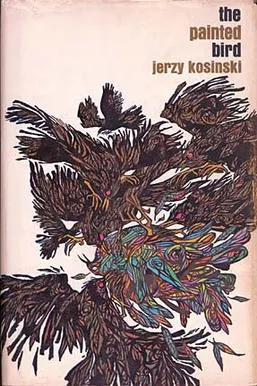If you don’t want to read something coughed up in the phlegm of a filthy Frenchman (somewhat filthy Frenchman here), read Jerzy Kosinski's The Painted Bird instead. Was it mostly made up? Sure! That doesn’t mean it won’t depress the shit out of you, which is the only reason anyone reads for non-research purposes anyways.
https://en.wikipedia.org/wiki/The_Painted_Bird
The book describes the wandering boy's encounters with peasants engaged in all forms of sexual and social deviance such as incest, bestiality, and r*pe, and in other forms of extreme violence exciting lust. The book's title was drawn from an incident in the story. The boy, while in the company of a professional bird catcher, observes how the man took one of his captured birds and painted it several colors. Then he released the bird to fly in search of a flock of its kin, but when the painted bird came upon the flock, they saw it as an intruder and viciously attacked the bird until it fell from the sky.
The plot
In 1939 at the beginning of World War II, a six-year-old boy living in the largest city of an Eastern European country invaded by Nazi Germany is sent by his parents to hide in the countryside because of their past anti-Nazi activities. However, they lose contact with him because of the chaos of the war and he is left stranded. As a result of his black hair and olive skin he is constantly accused of being either a Jew or a Gypsy, although Kosiński's narrator denies this.[1] He also has trouble understanding the local languages and dialects of the peasants he encounters. His first caretaker is a superstitious and unhygienic old woman named Marta, who refuses to allow him to look into her eyes because she is worried his "Gypsy eye" will curse her. Marta eventually becomes ill and dies, and the boy accidentally burns down her hut after spilling kerosene on it. Left to fend for himself, he wanders alone from village to village seeking shelter and food from adults in exchange for work. The boy endures various kinds of violence and cruelty, sometimes hounded and tortured, only rarely sheltered and cared for.
He is saved from an angry mob of villagers by Olga, an elderly folk healer, who takes him under her wing. Although she openly distrusts the boy because of his appearance, she gains his admiration for her cures. After he becomes infected with a local epidemic, she buries him up to his head in dirt and he is attacked by birds but recovers. However, he is caught by the villagers again and thrown onto a large catfish's air bladder, which floats him down the river away from the village.
He is then taken in by a miller and his wife, who frequently exposes herself to a young plowboy. After the miller beats his wife for her alleged infidelity one night, he invites the plowboy over for dinner and gouges out his eyes. The boy runs away again and seeks shelter with Lekh, a professional bird catcher in love with Stupid Ludmila, a promiscuous and scantily-clad woman who lives in the woods alone with a large dog after suffering a mental breakdown from a gang r*pe. After Stupid Ludmila does not return to Lekh for several days, he becomes enraged and starts killing random birds by painting them different colors and setting them loose to be killed by their own flocks. After Lekh leaves to search for her, Stupid Ludmila returns and attempts to molest the boy. They are found by the villagers and she is r*ped by all of the local men and beaten to death by their jealous wives. The boy leaves as Lekh inconsolably cradles her body.
From here, he journeys to another village where a local carpenter takes care of him, but during a storm he becomes worried that the boy's black hair will attract lightning and chains him to a cart in the field. The boy escapes and flees into a forest by stowing away on a train, finding an abandoned pillbox infested with rabid rats. However, the boy accidentally returns to the old village and the carpenter, blaming him after his barn was hit by lightning and burnt down, captures him and prepares to drown him before the boy pleads to spare his life in exchange for showing him the pillbox, which he lies is filled with military supplies. When they reach the pillbox, the boy accidentally pushes the carpenter into the pillbox and he is eaten alive by the rats.
The boy next stays with a kindly and well-respected blacksmith in a village with constant skirmishes and reprisals by rival bands of partisans and the Wehrmacht. The smith and his family are beaten and killed by nationalist partisans, who decide to turn him over to a German outpost as a goodwill gesture. He is taken to the woods by an old German soldier, who sets him free and pretends to execute him.
He escapes and travels to another village next to a German military railway, where the villagers discover Jews and Gypsies being deported to a nearby concentration camp. The villagers approve of this turn of events, seeing it as retribution for the crucifixion of Jesus. It is here that Kosiński adds some social commentary, describing the boy's belief that to have fair hair and blue eyes is to be favored by God. Kosiński sums up a Bosch-like world of harrowing excess where senseless violence and untempered hatred are the norm. One day, a young widow named Rainbow captures an injured Jewish girl who managed to escape from the train. The villagers resolve to hand her over to the Germans the next day. As the boy watches through a knothole that night, Rainbow r*pes the girl and they become stuck together, with a local healer killing the girl.
After German patrols intensify, the boy is forced to leave the village to avoid giving away the location of a Jew in hiding. He is captured by German soldiers and taken to a larger town where he is harassed by a mob before an SS officer hands him over to a Catholic parish priest. The priest treats the boy kindly, but the farmer Garbos and his dog Judas constantly beat and abuse him. After hearing the priest explain prayer and indulgences, the boy asks him to teach him how to pray so that he can accrue enough indulgences to save himself. After the priest dies, Garbos starts torturing the boy by hanging him from the ceiling above Judas, and the boy begins praying more. On the Feast of Corpus Christi, the priest makes him an altar boy, but he nervously botches the Mass and knocks over a missal. The angered congregation accuses him of being a vampire and attempt to drown him in a cesspit. Although he survives, he becomes mute.
In the forest he is caught the local boys and given to the farmer Makar, whose family was ostracized by the village. Makar's 19-year-old daughter Ewka begins fertively having s*x with the boy, which he enjoys. After the boy is unable to kill a rabbit, Makar beats and temporarily paralyzes him. A few weeks later, the boy finds Makar, Ewka, and her older brother Anton having s*x with each other and a goat in the field. Deciding that both they and the Germans became invincible by allying with demons, the boy flees into the forest again. While skating on a marsh, the boy is accosted by several young villagers who try to drown him after he accidentally wounds several of them with his skates. He is rescued by a woman named Labina, who later dies of a heart attack.
In 1944, the tide of the war turns as the Wehrmacht begins losing ground to the Red Army, and the locals begin arguing over the merits of the impending Soviet occupation. The boy wonders why God would allow the Soviets to win the war if they intended to abolish religion and private property. After the Germans withdraw from a village, Cossacks collaborators conduct a brutal raid before the arriving Soviets capture and execute them. The boy is treated in a field hospital and allowed to stay with the soldiers, where he is taught to read and indoctrinated into Stalinism and atheism by the political commissar Gavrila. The boy begins to hope to join the Communist Party and becomes preoccupied with others' opinion of him. After several soldiers are killed by local peasants with axes, the boy accompanies the respected crack sniper Mitka the Cuckoo as he takes revenge by shooting several of the peasants.
Afterwards the boy is taken to an orphanage in his old home city, where he denounces the principal and two nurses to the Soviets after they punish him for refusing to remove his military uniform. When the school officials refuse to discipline him further, he begins refusing to learn his own native language and getting in fights with the other children. He befriends another mute named the Silent One, and they begin sneaking out into the city and getting into mischief. After the boys discover how to operate a railway switch and later get beaten by a dairy vendor, the Silent One uses the switch to derail a train in an unsuccessful murder attempt against the vendor. Eventually, at age 12, the boy is finally reunited with his parents after they identify him via a birthmark. However, the boy frequently misbehaves, breaking the arm of his four-year-old brother. After the war ends, he begins sneaking out at night to hang out with criminals and political dissidents before he is caught by the Militia. When the boy grows sickly, the family moves westward into the mountains on a doctor's advice and the boy is sent to live with a ski instructor. After injuring himself skiing in a blizzard, the boy receives a telephone call to his hospital room and upon hearing the caller suddenly is able to speak again for the first time in years.







Jump in the discussion.
No email address required.
Not saying you need to eat only salad or anything but what you've said is reactionary and stupid.
Snapshots:
https://en.wikipedia.org/wiki/The_Painted_Bird:
Jump in the discussion.
No email address required.
More options
Context